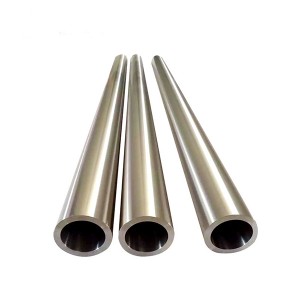99.95% molybdenum electrode bar for glass furnace
Molybdenum electrodes have high high-temperature strength, good high-temperature oxidation resistance, and long service life. Based on these advantages, they are commonly used in daily glass, optical glass, insulation materials, glass fiber, rare earth industry and other fields.
The main component of molybdenum electrode is molybdenum, which is produced through powder metallurgy process. The internationally recognized molybdenum electrode has a composition content of 99.95% and a density greater than 10.2g/cm3 to ensure the quality of the glass and the service life of the electrode.Replacing heavy oil and gas energy with molybdenum electrodes can effectively reduce environmental pollution and improve the quality of glass.
| Dimensions | As your requirement |
| Place of Origin | Henan, Luoyang |
| Brand Name | FGD |
| Application | Glass Furnace |
| Shape | Customized |
| Surface | Polished |
| Purity | 99.95% Min |
| Material | Pure Mo |
| Density | 10.2g/cm3 |

| Main components |
Mo>99.95% |
|
Impurity content≤ |
|
|
Pb |
0.0005 |
|
Fe |
0.0020 |
|
S |
0.0050 |
|
P |
0.0005 |
|
C |
0.01 |
|
Cr |
0.0010 |
|
Al |
0.0015 |
|
Cu |
0.0015 |
|
K |
0.0080 |
|
N |
0.003 |
|
Sn |
0.0015 |
|
Si |
0.0020 |
|
Ca |
0.0015 |
|
Na |
0.0020 |
|
O |
0.008 |
|
Ti |
0.0010 |
|
Mg |
0.0010 |
1. Our factory is located in Luoyang City, Henan Province. Luoyang is a production area for tungsten and molybdenum mines, so we have absolute advantages in quality and price;
2. Our company has technical personnel with over 15 years of experience, and we provide targeted solutions and suggestions for each customer's needs.
3. All of our products undergo strict quality inspection before being exported.
4. If you receive defective goods, you can contact us for a refund.

1. raw material preparation
2. Feed molybdenum material into the furnace for heating
3. reaction in furnace
4. collect
5. hot-work
6. cold-work
7. Heat treatment
8. Surface Treatment
1、 Electrode field
Molybdenum electrode rods, as a high-temperature material, have strong high-temperature stability and corrosion resistance, and are therefore widely used in the field of electrode manufacturing. In the electric discharge machining and laser cutting industries, molybdenum electrode rods can be used as electrodes and cutting blades. The high melting point and high wear resistance of molybdenum electrode rods make them widely used in the manufacturing of melt scintillation molybdenum zirconium electrodes.
2、 Vacuum furnace field
Molybdenum electrode rod is a widely used material in vacuum furnaces, commonly used as heating material for vacuum furnace heaters, fixed brackets for stainless steel heating tubes, and thermoelectric electrodes. The high temperature stability and corrosion resistance of molybdenum electrode rods can ensure the stability of workpieces during vacuum heating, so they are widely used in aviation, aerospace and other fields.





Molybdenum electrodes have good chemical stability and weak reaction with glass solutions, without significant coloring effects.
Molybdenum electrodes have high thermodynamic stability at high temperatures and are not easily decomposed or volatilized, so they will not introduce harmful impurities or gases into the glass solution.
The reaction product between molybdenum electrode and glass solution is also colorless, which further reduces its influence on the color of glass.
Correct electrode selection: Choose the appropriate molybdenum electrode specifications and types based on the specific application, ensuring that the size, shape, and material of the electrode meet the requirements.
Keep clean: Before use, ensure that the surface of the molybdenum electrode is free of impurities and oil stains to avoid affecting the thermal conductivity and service life.
Correct installation: Install the molybdenum electrode correctly according to the instructions or operation manual, ensuring a secure installation and preventing loosening or detachment.
Temperature control: When using molybdenum electrodes, it is important to control the temperature to avoid damage to the electrodes caused by excessively high or low temperatures.
Regular inspection: Regularly inspect the appearance, size, and performance of molybdenum electrodes. If any abnormalities are found, they should be replaced or repaired in a timely manner.
Avoid impact: During use, avoid hitting or impacting the molybdenum electrode to prevent damage or deformation.
Dry storage: When not in use, store the molybdenum electrode in a dry, well ventilated place to avoid moisture and corrosion.
Follow safety regulations: When using and maintaining molybdenum electrodes, relevant safety regulations and operating procedures should be followed to ensure the safety of personnel and equipment.
According to their different shapes, molybdenum electrodes can be divided into electrode rods, electrode plates, electrode rods, and threaded electrodes.










